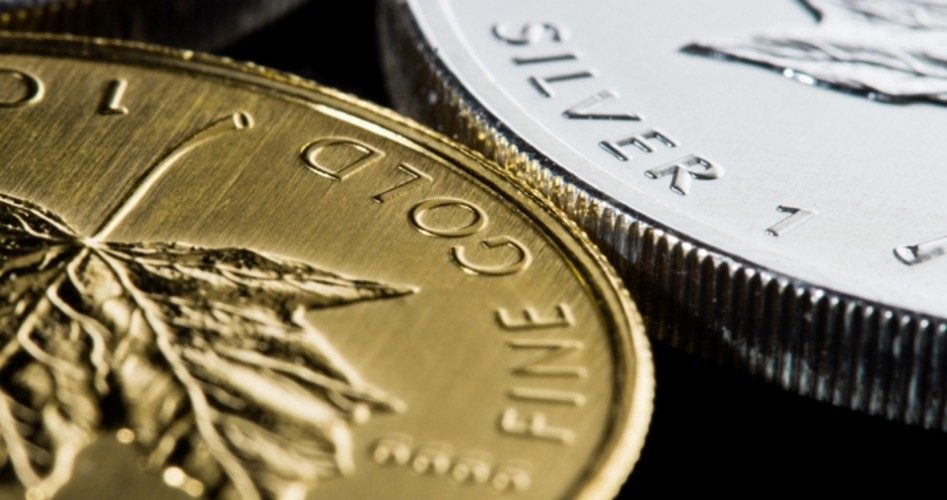
Arizona advocates of sound money landed a solid body blow to fiat currency on May 10 when the state Senate voted 16-13 to end the taxation on income derived from the purchase and sale of gold and silver.
The bill — HB 2014 — would further bolster the strength of sound money in Arizona by encouraging the use of specie as currency.
Although it seems self-evident, the condition of the U.S. economy, as (mis)managed by the Federal Reserve, makes it necessary to point out that it is financially unjust to tax the profit “derived from the exchange of one kind of legal tender for another kind of legal tender.” If a person goes to the bank and exchanges a twenty-dollar bill for two tens, there’s no tax on that transaction. Likewise, there should not be — and in Arizona soon won’t be — a tax on the exchange of paper currency for specie — coins containing precious metals.
Another provision of the bill defines legal tender as “a medium of exchange, including specie, that is authorized by the United States Constitution or Congress for the payment of debts, public charges, taxes and dues.”
That such a statement should be necessary is likewise ridiculous. Read another way, this part of the legislation is legalizing the Constitution in the state of Arizona!
Article 1, Section 10 of the U.S. Constitution very clearly mandates that, “No State shall … make any Thing but gold and silver Coin a Tender in Payment of Debts.”
That key provision, so important to the founders, was legislatively repealed, however, when Congress created the Federal Reserve and endowed that body with near unchecked authority over the economy of the union.
As it has stood for decades, in every state debts must be paid with either paper money printed by the Federal Reserve or with the coins minted by the U.S. Treasury. Very few of the latter contain any precious metal whatsoever, and the former is simply worthless linen whose value is inflated and deflated according to the irresistible will of the Federal Reserve.
During its century-long reign over the financial well-being of our country, the Federal Reserve has manipulated our currency until it is nearly worthless. Meanwhile, Congress turns a blind eye and a deaf ear to the crisis and the calls to control it.
The fact is that since 1913, when the Fed was established, the dollar has lost over 95 percent of its purchasing power. Most, if not all, of this precipitous decline was caused by the monetary policy of the Federal Reserve.
When it comes to the central bank and its machinations, the fix is in. The Fed — ostensibly a non-profit organization — owns the printing press and the money printed by it, and sets the terms of the loans it makes to the federal treasury. What’s more, there is no product; there is nothing being loaned other than worthless paper that can never be traded in for anything of value because all that is used to secure the worth of the currency is now owned by the very bankers who control the Federal Reserve.
And the Fed will continue to accumulate power. There is no limit to the lengths global bankers will go to in order to control the population of the world. There is no hope of regulating restraint. Power of this magnitude operates beyond the reach of regulations.
As it has since its founding in 1958, The John Birch Society offers Americans a well-established, experienced, and influential way of organizing with like-minded constitutionalists who demand the Federal Reserve be not only audited but also abolished. A statement from The John Birch Society declares the group’s position:
The powers of Congress are described in Article I, Section 8 of the Constitution, and the creation of a central bank like the Federal Reserve is not listed as one of those powers. The Federal Reserve is charged with protecting the value of the dollar through managing our nation’s monetary policy. However, since its inception in 1913, the dollar has lost 95 percent of its value under the Federal Reserve’s monetary oversight. The John Birch Society advocates abolishing the Federal Reserve.
For many years now, the recognized leader in the fight to end the Fed is former Texas congressman and presidential candidate Ron Paul.
In early March, Dr. Paul appeared before the state Senate committee that was considering the proposal.
“We ought not to tax money, and that’s a good idea. It makes no sense to tax money,” Paul told the state senators. “Paper is not money, it’s a substitute for money and it’s fraud,” he added, referring to the fractional-reserve banking practiced by the Federal Reserve and other central banks.
After the committee voted to pass the bill on to the full body of the Senate, Dr. Paul held a rally on the grounds of the state legislature, congratulating supporters of the measure and of sound money.
Paul told the crowd that “they were on the right side of history” and that even though those working to restore constitutional liberty to Arizona and all the states “had a great burden to bear,” there are “more than you know” working toward the same goal.
Referring to the bill’s elimination of capital gains taxes on gold and silver, the sponsor of the bill, State Representative Mark Finchem, said, “What the IRS has figured out at the federal level is to target inflation as a gain. They call it capital gains.”
Shortly after the vote in the state Senate, the Sound Money Defense League, an organization working to bring back gold and silver as America’s constitutional money, issued a press release announcing the good news.
“Arizona is helping lead the way in defending sound money and making it less difficult for citizens to protect themselves from the inflation and financial turmoil that flows from the abusive Federal Reserve System,” said Stefan Gleason, the organization’s director.
An article published by the Sound Money Defense League early in 2016 rehearsed a little of the history of the propensity of the Establishment to ignore the lessons of the financial disorder of the decades before and after the War for Independence and to lean on the familiar and fragile crutch of fiat (unbacked) money:
Abraham Lincoln financed the Civil War in part by debasing the currency. By 1863, inflation ran rampant in the North and in the Confederacy. The Confederate States of America dollar was backed by nothing but the hope that it would retain its value in the event of a Southern victory. Today, Confederate dollars aren’t worth anything except their historical value to collectors — another in a long line of fiat currencies that failed.
In the aftermath of the carnage wrought by the Civil War, America entered into an extended period of economic ascent marked by stable price levels. The U.S. dollar, backed by gold, became King Dollar. Not until World War I did high rates of inflation return.
The administration of Franklin D. Roosevelt ushered in an era of Progressive policies that ruined the country’s economy and firmly planted the Republic on the cornerstones of Progressive ideology: a central bank, personal income tax, and a slate of “entitlements” that would create a class of Americans dependent on the federal government.
The Founding Generation learned the hard way about the economic disasters associated with paper money and the hyper-inflation or default of debts that unbacked currency creates.
Thomas Jefferson remembered those days, and in 1813 he warned, “Paper money is liable to be abused, has been, is, and forever will be abused, in every country in which it is permitted.”
This is precisely the reason why the men who drafted the Constitution empowered Congress to mint gold and silver — sound money — and why they included not a single syllable authorizing the legislature to surrender that critical power to a plutocracy with a penchant for printing fiat money.
Slowly, states may be summoning back the days when money was actually worth something. At least 20 states are currently considering doing as Arizona is about to do and remove the income tax on the capital gains from the buying and selling of precious metals.



